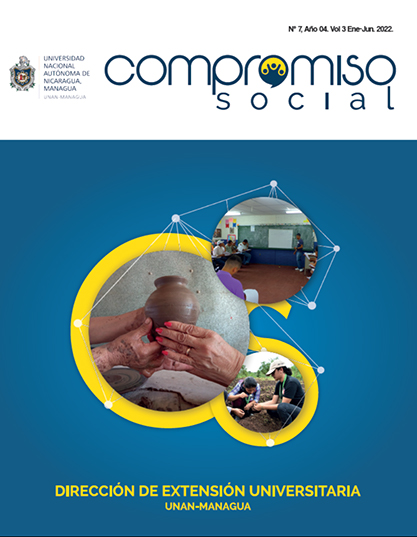Experience of the socio-economic transformation in the community and the family through the graduates of the UNICAM program in the Las Sabanas Department of Madriz and Miraflor Sub-zone of the Municipality of Estelí, in the first semester of the year 2019
DOI:
https://doi.org/10.5377/recoso.v3i7.18651Keywords:
UNICAM, Socioeconomic Experiences., Experiences, Skills, Systematization, Innovation, , EntrepreneurshipAbstract
The implementation of the UNICAM program in the subzone of Miraflor-municipality of Estelí and in the municipality of Las Sabanas-department of Madriz, represents an opportunity for first-generation graduates to train professionally and put into practice the knowledge obtained, and thus promote entrepreneurial and innovative businesses, taking into account the community and local resources. The methodologies applied within the UNICAM program, such as the New School, have fostered the integration and training of professionals contextualized to the community reality. Systematization aims to reconstruct the experience of graduates in the UNICAM program and assess the contribution they are making to the community, thus obtaining a socioeconomic transformation. This corresponds to the qualitative paradigm, the approach is focused on a participatory intervention process, depending on the scope, it is a total systematization, because it covers the entire experience. Due to the type of experience, it is a systematization of programs and retrospective, because it was carried out after the completion of studies of two generations in two territories, taking into account the years of education. 10 graduates and 2 teachers and 4 community leaders participated, analytical and participatory collection techniques were applied: observation, timeline, in-depth interviews and workshop for recognition and improvement of entrepreneurship of the graduates. The information was classified from the axes of systematization, categories and subcategories, after the stage of critical and interpretive analysis, the conclusions, lessons learned and recommendations were identified. The results show that the training process was a phase to strengthen its sense of belonging with its reality, developing competences for innovation, entrepreneurship and sustainability of personal and collective resources; enabling survival strategies, which places them as protagonists of the changes and contributing to family and community development.
Downloads
References
GRUN. (2022). Plan Nacional de Lucha contra la Pobreza. Managua. Obtenido de https://observatorioplanificacion.cepal.org/sites/default/files/plan/files/PNCL-DH_2022-2026%2819Jul21%29.pdf
Jara Holliday, Ó. (Febrero de 2012). REVISTA INTERNACIONAL sobre INVESTIGACIÓN en EDUCACIÓN GLOBAL y para el DESARROLLO. Obtenido de http://educacionglobalresearch.net/wp-content/uploads/02A-Jara-Castellano.pdf
Jara, O. (2018). La sistematización de experiencias:práctica y teoría para otros mundos posibles. Bogota: Centro Internacional de Educación y Desarrollo Humano - CINDE. Obtenido de https://repository.cinde.org.co/bitstream/handle/20.500.11907/2121/Libro%20sistematizacio%cc%81n%20Cinde-Web.pdf?sequence=1&isAllowed=y
Nitlapan UCA. (27 abril, 2016 de Abril, 2016 de 2016). Nitlapan Instituto de Investigación y Desarrollo. Obtenido de http://www.nitlapan.org.ni/index.php/un-vistazo-a-la-juventud-rural/
Ortega, P., & Torres, A. (2011). Lola Cendales González, entre trayectos y proyectos en la educación popular. Revista Colombiana(16). Obtenido de https://d1wqtxts1xzle7.cloudfront.net/52503799/Lola_Cendales__entre_trayectos_y_proyectos-libre.pdf?1491452107=&response-content-disposition=inline%3B+filename%3DLola_Cendales_Gonzalez_entre_trayectos_y.pdf&Expires=1655242894&Signature= JL4UDy7kZTyFjQq0sXc
Ramírez, M. (2022). Desarrollo sustentable en áreas rurales marginadas: entre la sobrevivencia y la conservación. Papeles de POBLACIÓN(18). Obtenido de https://rppoblacion.uaemex.mx/article/view/18160/13354
Rojas Meza, J., & Ramirez Juárez, J. (2011). Desarrollo Rural en Nicaragua. Una visión de sus problemas y alternativas. Managua, Nicaragua: Adea- UNAN-Managua.
Salcedo, S., & Guzmán, L. (2014). Agricultura Familiar en América Latina y el Caribe: América Latina y el Caribe:. FAO. Obtenido de file:///D:/2022%20Extensi%C3%B3n/2022%20articulos%20para%20publicar/LIbro%20---%20agricultura.pdf
Salmerón, F., & Valverde, O. (2016). Agricultura sostenible para enfrentar los efectos del Cambio Climático en Nicaragua. En B. Landero, S. Obando, F. Salmerón, & L. Valverde, Agricultura sostenible para enfrentar los efectos del Cambio Climático en Nicaragua. Fundación Friedrich Ebert. Obtenido de https://library.fes.de/pdf-files/bueros/fesamcentral/12896.pdf#page=10
Serna, J., & Patiño, S. (2018). Educación y desarrollo humano en los contextos rurales1. REVISTA TEMAS, 3(12). Obtenido de https://dialnet.unirioja.es/servlet/articulo?codigo=6749437
UNAN-Managua. (2011). PROGRAMA “LA UNIVERSIDAD EN EL CAMPO”. Ingieneria Rural Sostenible.
Downloads
Published
How to Cite
Issue
Section
License
Copyright (c) 2022 Universidad Nacional Autónoma de Nicaragua, Managua (UNAN-Managua)

This work is licensed under a Creative Commons Attribution-NonCommercial-ShareAlike 4.0 International License.




